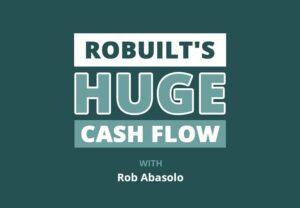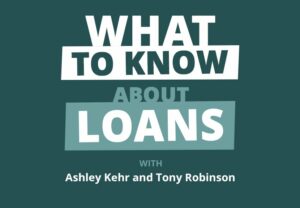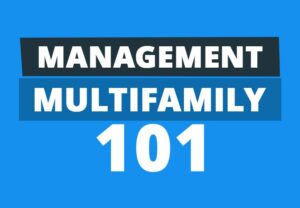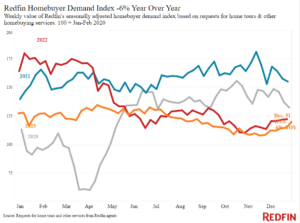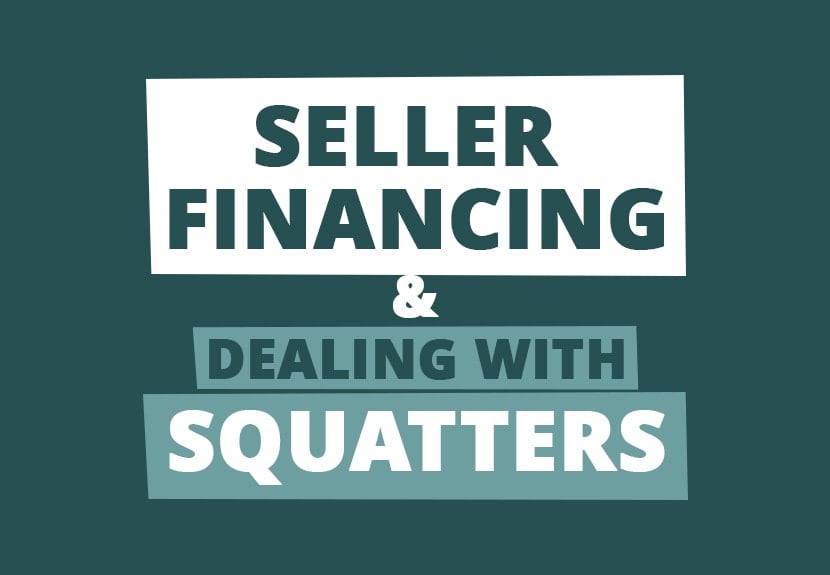
Does seller financing apply to down payments? What happens when you buy a rental with squatters who refuse to leave? And is getting your real estate license even worth it? The world of real estate investing isn’t always as cut and dried as it seems, but running a profitable portfolio doesn’t need to be a massive headache. In this Rookie Reply episode, we’ll go through the common pain points that rookie landlords are dealing with and shed light on some frequently asked questions only experienced investors (like Ashley and Tony) have the knowledge to answer.
If you’ve ever wondered what a property survey is or if you should charge a cleaning fee to your tenants, stick around! This time, Ashley and Tony will answer when you do (and don’t) need a property survey on your latest rental property purchase. From there, they debate the pros and cons of getting your real estate license (becoming an agent) as a rookie investor. We also touch on the ever-fun topic of what to do when non-leased tenants won’t leave your property, how to seller finance a down payment, and whether or not charging a “cleaning fee” at move-in is a wise idea.
If you want Ashley and Tony to answer a real estate question, you can post in the Real Estate Rookie Facebook Group! Or, call us at the Rookie Request Line (1-888-5-ROOKIE).
Click here to listen on Apple Podcasts.
Listen to the Podcast Here
Read the Transcript Here
Ashley:
This is Real Estate Rookie episode 268.
Tony:
I think a lot of rookies maybe make the wrong assumption that they need a license to be real estate investors, when the majority of real estate investors that I know don’t have their license, and instead, we hire someone who is an expert in that specific thing and we leverage their expertise, because my agent in Joshua Tree, him and his team, I absolutely love them because they have the process of buying and selling real estate down to a science. Like, if I forget to schedule my inspection, his transaction coordinator is saying, “Hey, I’m going to schedule your inspection for you.”
Ashley:
My name is Ashley Kehr and I’m here with my co-host Tony Robinson.
Tony:
And welcome to the Real Estate Rookie Podcast where every week, twice a week, we bring you the inspiration, motivation, and stories you need to hear to kickstart your investing journey. As always, I want to start today’s episode by shouting out someone by the username of KSP75. KSP left us a five star review on Apple Podcast. It says, “I own a multifamily home and my family lives in part of the house, so I have some exposure to tenants, leases, et cetera. Real Estate Rookie is fantastic to listen to as it gives information, guidance, and confidence to move to the next level of real estate investing. I plan to devour every episode, take notes, read, research, and be 100% ready with absolute certainty to pounce on my next deal when the conditions are right.” So KSP, we appreciate, you and I love that you’re going to have the information, guidance, and confidence soon to take that next deal down.
Ashley:
So Tony, what is new with you?
Tony:
I got a different color shirt on today, so I’m rocking the maroon. I guess. It’s almost black, but not quite.
Ashley:
I had to turn up the brightness of my phone because I still thought it was black until the producer said something and I turned the brightness, I’m like, “Oh yeah, it is a different shade.”
Tony:
I think I might try a different color for 2023, so we’ll see. But no, on a serious note, we’re actually, I think I’m going to be flying out to West Virginia this weekend. We just got an LOI signed on a deal we’ve been looking at out there. It’s really cool piece of land that we’re looking at. It’s about six acres, and it’s near a new national park out in West Virginia, and the property itself has a main house, a guest house, five RV pads, and then it also has the permitting to add a bunch of glamping sites as well. So the idea is that we’re going to buy that property, add the glamp sites, renovate the primary house, and then probably buy a few Airstream campers as well to kind of make it a little destination out there. So we’re excited for it.
Ashley:
That’s awesome. That’s really exciting.
Tony:
Yeah.
Ashley:
Have you been to West Virginia before?
Tony:
Never in my life. This will be the first time.
Ashley:
When I was younger, I used to go to the IBO World Championships for archery there. Me and my dad and my brother would call [inaudible 00:02:51].
Tony:
You were in the world championships for archery?
Ashley:
For like one league, the IBO League, but yeah.
Tony:
Why am I just now hearing about this? Have you ever told me that you were in the world championships for archery?
Ashley:
I don’t know. I mean, I feel like it’s not that big of a deal. I don’t know. But yeah, I used to do 3D target archery shooting when I was younger.
Tony:
I mean, how many people can say that they’ve been in the world championships for anything?
Ashley:
But anyways, it was at Snowshoe Mountain each year in West Virginia and I just loved going there. It’s like a little ski village on top of the mountain, and it was super cool. The whole archery tournament would be walking up and down the hills to do the 3D shoot and stuff, so it was really cool.
Tony:
Yeah, I’ve never been, so I think we’re going to take off this weekend and it’ll be kind of a quick turnaround trip, but we’re super excited. This will be our first time doing anything with glamping. Wasn’t even really in the game plan, but the property kind of presented itself. Actually, this person reached out to me on Instagram, and I’m not the best at checking my DMs, but every once in a while I’ll go through and kind of try and clear them out, and someone had sent me a deal, was like, “Hey, yeah, I’m looking to offer at this.” So if you guys have some other good deals that kind of fit that criteria, please continue to send them to me because this wouldn’t have happened without that guy.
Ashley:
I’m also going away this weekend, but unfortunately it’s not for a deal. It is for a real estate girls weekend in Las Vegas. So some women real estate investors have become my closest friends. So we are having a girls weekend in Las Vegas. We do a lot of trips together, but it’s usually our whole group of friends, but this time it’s just going to be a couple of the girls, and yeah, we’re about to take down the Las Vegas strip.
Tony:
As long as you don’t have more fun with them than you had with me and Sarah last summer, I think it’s totally fine.
Ashley:
Well, you know what? I think you’re safe because the pools are closed this time of year, so there’ll be no pool party.
Tony:
No pool parties.
Ashley:
But I’ve also, I’ve been to Las Vegas, I don’t know, probably 12 times, but I’ve never been to a Las Vegas nightclub. That’ll probably be my first time this weekend.
Tony:
Well, as long as it ranks your second most fun Vegas trip, and I think we’re square. We’re good.
Ashley:
So today on the Rookie Reply, we actually have some great questions that our producer pulled from the Real Estate Rookie Facebook group. So we’re going to be talking about cleaning for turnover. So after a tenant moves out, how you should charge for it, what’s common, different ways that you kind of charge for the cleaning. Also, a little bit of seller financing, if the seller does offer that to you, how does that work along with getting bank financing in the same place, and then we talk about getting a survey done on a property. Tony and I have very different experiences with that, so if you guys want to weigh in as to what is common in your area, we’d love for you guys to hop in onto the YouTube comments and comment below as to whether you typically do or don’t get a survey when purchasing a property and why.
Okay, so today’s first question comes from Jason Dorsey. “When purchasing a property, what’s the purpose of getting a survey? The realtor is asking if I’m going to get one.” Okay, so a survey, a survey is of the land. So where the boundary lines are, you’re going to find out where, how large the parcel is, so how many acres and where those lines actually go. So what is your property that you’re actually buying and what is the neighboring property. Tony, is it common for people to get surveys done where you live to purchase the property?
Tony:
At least not the properties that I’m buying. I don’t think a realtor or anyone or even my lenders have ever asked me to get a survey, but also our parcels are pretty small. I think the lot lines are pretty well-defined typically. So maybe that’s why it’s not as much of a concern for the markets that I’m in.
Ashley:
Yeah, I don’t think I’ve ever closed on a property without having a survey which is interesting.
Tony:
Isn’t that so crazy?
Ashley:
Yeah. For here, it’s very common to have the survey done, and usually, typically, the seller pays to have the survey done where a surveyor comes out, marks the property, maybe stakes the corners of the lot for you, and then draws out basically the survey map. They’ll put usually where the house is located on the property, the property lines where a street is. Sometimes though a person maybe already had a survey done maybe previously when they purchased the house, or I bought a little A-frame cabin last year and there was an old survey from like the ’90s, and I accepted that survey and just had the seller sign an affidavit of no change stating that they were saying that there was no changes to the parcel line. Usually it’s only recommended that you go back and accept a survey that’s maybe only a couple years old, just to have that sense of security that there weren’t any changes to the parcel and to your survey lines.
I did have a property that when the survey was done, there was a dispute with the neighbors that it wasn’t actually done correctly, and we didn’t close and our closing was pushed off until that actual dispute was done and the lines were actually defined as to where the parcel actually went. This is where you can also find out if there’s easements on the property too. Around where I live, it’s very common for an easement to the gas company where they have a gas line. Actually, on my primary residence, we have a gas well, and there is a road that goes back to the gas well on the property that the National Fuel is the gas company that they can go and have access to at any time. And then they pay, we get free gas to our house which is great. Yeah, unlimited consumption, which you don’t even hear that these days. So just there’s different things like that you can also find out from having the survey done on the property.
So if it’s recommended from your real estate agent, ask if that’s something the seller is going to provide. If not, you can always pay for the cost of the survey to be done, and depending on the size of the parcel, I mean, typically I see for a couple acres, not a ton of buildings or anything on it, it could range from 400 to maybe $1,000 at the highest.
Tony:
Interesting. Yeah, I’ve literally never heard of that. I’m looking through closing docs as you’re talking for some of our old properties to see if maybe it was in there and I just didn’t even notice it, but I don’t see anything about a survey in any of the documents that I have. The closest thing that I have, it even shows the lot lines, is from the title report and the very last page just has like a bird’s eye view of all the different parcels on that street, and it just kind of outlines which parcel is ours. But no, that’s so interesting. I’ve literally never done that before.
Ashley:
Yeah, I’m actually shocked too about that one. We had the episode where we talked about wells and how you guys don’t typically have wells where you were first purchasing, but yeah, for a survey, to have that done. Yeah, I would recommend getting a survey done or seeing if they have one already done. It just, it makes things a lot easier too if you’re getting bank financing. I’ve recently had banks ask for a copy of the survey too which I previously hadn’t had that done, but I just did a commercial loan where they asked for a copy of the survey.
Tony:
Yeah, and now it makes me wonder if I’m maybe opening myself up to issues down the road by not doing that survey when we are purchasing the property, especially if it’s only a few hundred bucks. It’s just to make sure that there are no issues with the property lines or what if the neighbors fence is like 10 feet further than what it’s supposed to be. You can see some of that stuff, like my realtor, they use LandGlide, the app or something. So if we’re at the property, they’ll like, “Hey, here’s where the line is,” and stuff like that, but it’s probably something we should take a little bit more seriously now that I’m hearing about this.
Ashley:
Yeah, we use LandGlide too and onX Hunt. We did a little experiment actually a couple weeks ago where this 30 acres I had bought, we walked the property line. It was right after hunting season had ended, and it was amazing how close some of the tree stands were that were for the neighbors that were… They were facing towards their property, but there was some instances where it’s like, “Eh, that actually might be on our property,” their tree stand. But the onX Hunt we did notice, and the LandGlide, was a little bit off from where the actual stakes were in the corners of the property too. It wasn’t super accurate.
Tony:
Spot on.
Ashley:
Yeah.
Tony:
Cool. Well, should we should move to question two?
Ashley:
Yeah, let’s go to the next one. “Can you share pros and cons in getting your real estate license just to help yourself in real estate investment deals?” This question comes from Teresa Molter from the Real Estate Rookie Facebook group. If you guys aren’t in the Real Estate Facebook group yet, make sure you are joined. It is worth signing up for Facebook just to get into this group, and you get to connect with a lot of like-minded investors and also ask questions that we may play onto the show. So Tony, neither one of us have our real estate license, but Sara is getting her license, correct?
Tony:
Sara is working on getting hers. Even as she’s gone through this whole process, she’s almost at the finish line now, and we’re still debating does she even need to go through the final step of taking the test. There’s a few things that we’re looking at, right? First is it’s a pretty lengthy process in California to get your license. You have to take three courses, there’s some additional certifications you have to get, and you finally have to take this exam which is a pretty lengthy exam as well, and obviously there’s some costs associated with all of this as well. But it’s not like in 30 to 45 days you can have your license. It’s like a six-month ordeal at minimum, maybe even longer depending on how fast it takes for you to go through all the coursework.
So I think the first question that anyone should ask themselves, but Teresa for you specifically, is how much time and money and energy will it take for you to get your license. And then the second thing is what is your goal in doing this. You said that maybe it’s just to help yourself in your own real estate deals. Are you looking just that you have MLS access? Do you want to maybe save on commissions that you would pay to a buyer’s agent when you’re buying something or a seller’s agent if you’re selling something? What is your motivation for doing that? And then what is the volume that you think that you’ll actually use it? If you’re buying one deal a year, does it really make sense to go through the hoops of obtaining and maintaining that license on an annual basis or however frequently it is in your state?
I think a lot of rookies maybe make the wrong assumption that they need a license to be real estate investors, when the majority of real estate investors that I know don’t have their license, and instead we hire someone who is an expert in that specific thing and we leverage their expertise, because my agent in Joshua Tree, him and his team, I absolutely love them because they have the process of buying and selling real estate down to a science. If I forget to schedule my inspection, his transaction coordinator is saying, “Hey, I’m going to schedule your inspection for you,” or, “Hey Tony, just a reminder, your due diligence period ends in seven days. If you want to get your request out, let’s make sure we do that today.” So I do think, Teresa, that if your goal is just to save money, maybe not do it, but if you really want to be an agent, then I will probably go for it.
Ashley:
I started my real estate license like three times. I think I paid like $99 for the online course. This was, I don’t know, five years ago or whatever. You have to rebuy the course after a year or whatever. But it got to the same point as to why do I need it, and really the only reason I was going to get it was so that I could take myself to showings, so I didn’t have to schedule showings with somebody else, with an agent, and I could just go to the properties. Then I got to the point where most of my properties were off market deals. That was the only benefit really to me. Of course, saving the money on the commission, but I think it is worth paying the money to have somebody else do the paperwork, draw up the contract, talk to the other agent, deal with the things that come up.
Especially, I think it’s a huge advantage having an agent when you have tenants in the property and you’re trying to sell. Scheduling showings with tenants in properties can be a nightmare of just coordinating with them, getting them to grant access. I’ve gone to so many showings of properties where I’m supposed to get in a unit and we get there and it’s like, “Nope, sorry. The tenant said no or they were supposed to be here, they’re not. We don’t have keys,” things like that. I actually sold two properties within the last year that had tenants in place and literally I just, I went with a real estate agent who worked with my property management company, said, “This is what I want to sell it for. Here’s my property,” and he got all the tenant’s information from the property management company, he coordinated every showing with them directly. That right there was worth the commission in itself of having to do that.
I agree with Tony on this. If you want to actually run a business as a real estate agent and buy and sell houses for other people, then yes, it could be worth it because remember, there’s those continuing education costs. To keep your license going, it’s going to cost you money, it’s going to cost you time to take those continuing education classes too.
Tony:
Yeah, I totally agree, Ash. I think it comes down to the ultimate motivation. Just like you said, I would rather pay someone to handle all of the administrative work than me do that myself. But again, I get it. We’re kind of in different spaces in our real estate journey, so maybe it makes more sense for us to do that. But my personal thought, Teresa, is that if you don’t plan to make this an actual income source for you, I might focus more of my time on building my real estate business first and then looking at the agency stuff or the agent work later.
Ashley:
Okay. Onto our next question by Rick Watts. “Has anyone ever purchased a home with occupants in it? Anything I need to consider in trying to get them out? They were there with the permission of the previous owner, but there’s no lease agreement of any sort and they don’t seem willing to leave. I’ll probably talk with an attorney regarding my legal obligations. I’ll soul search a little for the ethical obligations as well. Just didn’t know if anyone has experienced this before.”
Tony:
Ash, can I start with a question to you first, right? I never buy properties with tenants. Even our flips that we purchase, a lot of times they are long-term rentals beforehand, but it’s always a requirement on my end is the buyer to make sure that the tenants have vacated. There’s actually a flip that we’ve had under contract for almost two months now because the seller is working to get those tenants out. So my baseline is just I’m not going to buy it if there’s a tenant in there because I don’t want the headache of having to try and evict. From you, from your perspective, if you have a property that you’re looking at purchasing and you already know that the tenants don’t want to leave, would you still move forward with buying that?
Ashley:
Yeah, and I think something with this question that Rick maybe didn’t know the do enough due diligence I think maybe as this property was under contract, because I think there’s some ways that he could have handled this before getting it under contract. Trust me, there’s so many things I wish I would’ve known on the first couple properties I did too.
I’ve boughten quite a few properties that have tenants in place, but what I do is I do an estoppel agreement where I compare what the landlord is saying to what the tenant is saying. The tenant or the landlord will either say, “Here’s the terms of the lease, here’s the lease agreement.” Or, if it’s in Rick’s situation, there’s no lease agreement, it’s will they just give me $400 cash per month and they’re month to month and this is their name, this is their phone number, this is all I have. Then I’ll contact the tenant, with the owner’s permission of course, and have them fill out an estoppel agreement which basically gives me more information about them but confirms what the landlord said. Are they saying their rent is also $400 a month? Are they saying that they’re actually in a five-year lease agreement where the landlord’s saying, “No, well you can get them out as soon as you close on the property”?
So there are steps that you can take. You can also use this as a negotiation too. I recently sold a property and the person purchasing it wanted the tenants removed from the property before buying. What we did was we gave notice for them to vacate. They were month to month, we gave the proper notice, they said, “No, we’re not leaving.” So we started the eviction process and we actually still closed on the property, but we held money back in escrow to pay for attorney fees if they had to continue with the eviction. We set a dollar amount, I think it was maybe like $1,200 or whatever to cover attorney costs if they had to continue with the eviction if the tenant didn’t leave. And so, when the tenant left on their own without having to proceed with the eviction, I was refunded that $1,200. And then if they would’ve had to go through with the full eviction, the buyer would’ve gotten to keep that $1,200 to help cover the cost.
There is some way that you can kind of address this issue before closing on the property is stating in your contract that the property to be vacant. In this exact situation here with Rick is you’re going to have to start the eviction process to get these people out of the units. Things to be concerned about is that there is no lease agreement to the property and you want to be careful that you go to court and all of a sudden a lease agreement appears. So getting some kind of documentation maybe from the previous owner stating that they were living there at this X amount, there wasn’t a lease agreement or they were month to month, something along those lines can definitely help your case.
But as far as doing your soul-searching for ethical obligations, you are well entitled to the right of that property, and just do the legal process of going through with the eviction. And then, Tony, you may know more about this as far as squatter rights. I mean, are they even paying any rent here or are they just living in the property? Because that can be a whole nother issue in itself where you would have to again go through the eviction process, but excuse me, in California I believe there’s very lenient squatter rights. Is that correct?
Tony:
I don’t own any long-term rentals in California. I never have. But I do know that, and don’t quote me on this because I could be a little off, but I’m pretty sure that even if someone just finds an open house and they stay there long enough with no permission from anyone, they can technically have rights as a tenant. It definitely is going to vary state from state, Rick. So chat with an attorney in your state to get that right information, but my preference has always been I just don’t buy property that have tenants in there if I don’t plan to keep those tenants.
Ashley:
Yeah, and I did a house flip with James Dainard in Seattle, Washington and there’s pretty favorable squatter rights there too. I always joked with him, well, if this deal goes south, I’m just going to move into the property and I can at least live there for probably a year or two for free to get my return back.
Tony:
Before you get evicted.
Ashley:
Okay, so let’s go on to our next question. This question is from Rob Young and also comes from the Real Estate Rookie Facebook group. “What are the risk associated with seller financing the down payment? I’m the buyer. The seller doesn’t own the home free and clear. I can get the mortgage but don’t have the money for the down payment. Seller is willing to extend terms. He would have to satisfy his mortgage when he sells. Any advice?” Okay, let’s kind of map this out maybe first. Okay, so Rob is going to get a mortgage to purchase this property. Okay, let’s just use, for easy math, let’s say he’s buying it for a $100,000. He’s getting a mortgage for 80%, so $80,000 and he needs $20,000. The seller is saying, “I will loan you the $20,000 for the down payment. You have to pay me X amount over five years,” or whatever that is.
So the thing with this though is that the bank is going to want to see where that money came from, especially if you’re doing it residential where you have to show that you earned that income or you had that money saved or that money came from you, or it was a gift from a family member. Seeing that you got the money from the seller may not qualify as proof of funds for the property. That’s the first discussion I would have is going to the loan officer, the lender that you’re using and ask about the situation.
If you’re doing commercial financing, I know that this happens quite commonly where the seller will do seller financing for the down payment. You disclose it to the bank, the bank runs the numbers and says, “Okay, this rental property can afford to pay its monthly expenses including these two mortgage payments, one to the bank for the $80,000 and the other to the seller for the $20,000. Approved. Go ahead. Let’s move forward.” But that’s my concern with this. Is this going to be residential financing or is this going to be commercial financing? So that’s kind of like the first step I would look at for this kind of situation.
Tony:
And I think, Rob, just to give you some clarity on kind of how the money flows between buyer, bank, seller, bank, because there’s a few steps in there, right? So going back to your example, Ashley, of say that Rob is buying this house for $100,000, he’s getting a mortgage for $80,000, and he has a down payment of 20, and let’s say that this seller maybe owes $35,000 on the house. Using round numbers, if they’re selling it for 100, they’re going to pay off their $35,000 mortgage, they’ll be left with $65,000 afterwards, right?
But Rob, the money just doesn’t flow from you directly to the seller. Usually there’s a third party in between. In California, we use title and escrow companies, and the way that it works is when the bank sends their check in for $80,000, they’re going to send that into title and escrow. Escrow’s then going to go to the seller and say, “Hey Mr. Seller, this money is for the property that you’re selling to Rob. We see that you still owe $35,000 to Bank of America for this property. So before we issue you any funds, we’re first going to pay off your $35,000 debt that’s due to Bank of America and you will get the balance which is 65,000.” So, Rob, you don’t necessarily have to worry about the seller paying off that initial mortgage because as long as you go through title and escrow, they’re going to make sure that any debt or any kind of liens, anything against that property are paid off before that money actually goes to the seller.
Ashley:
Yeah, so that’s a great point is you want to make sure that the money you’re paying, so that $80,000 in our example, would cover what is owed on the mortgage or that the seller does have the money. But like Tony said, that’s something that title will make sure happens at closing and you’re not all of a sudden going to own this property but there be another lien still left on the property from the previous owner.
Tony:
Ash, based on what you said, I do agree. I think it is common that you’ll see sometimes the seller will carry back some portion of the down payment, and honestly, I think there are some smaller banks, if Rob’s working with maybe a local credit union or something that might be comfortable with the seller having a second lien against the property as well. Rob, that’s typically where banks kind of feel weird, where they don’t want anyone in second lien position. They want you to have some kind of skin in the game and not another lender. But if you’re working with maybe a smaller credit union or local bank, maybe they are comfortable giving you 80k for the first and then having the seller give you 20k for the second. So I think it depends on what bank you’re working with.
Ashley:
Especially if you’re buying the property below market value. If you can show the bank comps and say, “Look, I’m buying this house for 100,000, but any other house that’s like this around me is selling for at least 150,000. I’m already buying it $50,000 below market,” or whatever that is, that definitely would help your case too.
Okay, so our next question here is from Eric Donno. “Cleaning and move-in fees, how do you work with fees? For my long-term rentals, I have been charging a move-in fee to cover a professional cleaning prior to move-in. My thinking was it’s better to do this than to take out the cleaning fee from their deposit on move-in. How do you deal with cleaning? Do you just eat the cost, take it out of the deposit upon move-in , don’t clean at all?” Okay, so this is more of a long-term question, but Tony, maybe after we go through the long-term rental situation, you can even cover it on the short-term rental side too.
For a long-term rental, you can charge a move-in cleaning fee. I don’t typically see this often. Really, I honestly don’t know if I’ve ever seen anyone do this. I mean, you can charge a fee, unless your state doesn’t allow you to do that. What I do is I do a cleaning checklist. When somebody moves into the apartment, they walk through with me and we do almost like an inspection of the property where they can say, “You know what? There’s this dent in the trim here. I don’t want to be charged for that. There is a stain in this corner of the carpet,” whatever these things are. They can go through and mark, or they’re going to go through and just say, “yep, everything is in great condition, great condition, great condition.” Maybe there’s a little wear and tear on one of the cabinets, they can mark that down. Document everything with photos, you as a landlord sign or the property manager, and then the tenant also signs, date it, and this is the date they receive their keys, they’re going into the unit. Okay? Everything’s fine and good.
Then when it is time to move out, they are given a cleaning checklist. I actually provide this upfront when they do move in. So hey, just so you know when you move out, this is everything that needs to be cleaned. I actually got this list from my sister. When she graduated college, she had to move away for a teaching job for a couple of years, and the apartment that she was in, I went to move her out when she was done and they gave her this cleaning checklist and it itemized everything as to if this wasn’t done, what you would be charged. So if you didn’t clean out the fridge, that was $10 or whatever it was. I mean, this was actually a pretty nitpicky list and where it’s wiping down the blinds, everything like that.
I remember my sister just freaking out that it wasn’t going to be clean enough. I mean, she literally did not even touch this place the whole year she lived in it or whatever it was. It was spotless. I remember the manager coming to do her move out inspection and he just glanced around, he’s like, “Okay, it looks great.” She’s like, “That’s it?” And he’s like, “Yeah, yeah, you took really good care of this place. Thank you.” And she had two days before spent just cleaning every little speck of corner even though there wasn’t even any dirt or dust in it. So implementing some kind of checklist where your tenants know ahead of time, this is the expectation for when you move out so there’s no surprise, and they’ve already signed that inspection sheet saying you both agree that it’s in good condition. There was nothing wrong with the unit when they moved in.
And then I always refresh, when they give their notice they’re moving out, give them that inspection sheet. That’s where you can write down this is the cost per an item. If the carpets need to be cleaned because there’re stains, they need to be professionally cleaned or something like that, that is $100 charge, whatever it is. Or, you can do a flat rate cleaning fee. If you don’t clean the unit, have this checklist of things cleaned, we’re going to charge you $250 because that’s what it costs us to have somebody come in and do that. And then when the tenants move out, they have their belongings. You come in and you do the walkthrough with the tenant stating, “Okay, this wasn’t cleaned here, this wasn’t there.”
In New York State in June of 2019, they actually changed the law where you actually have to offer the tenant to do the move out inspection prior to them actually moving out. When they give notice, I think it’s two weeks before their actual move out date, you have to offer them the chance to have an inspection there, it’s kind like a pre-inspection, so that they have the opportunity to correct anything. Say there’s a hole in the wall or something. This gives them the opportunity to patch and paint it, which if you guys follow me on Instagram, you can see that’s not always the best thing is to have your tenants do repairs on their own. That’s the way that I’ve done it and I typically see it is that there’s no fee charged and that can be taken out of their security deposit until after they have moved out.
Tony:
Yeah, that is a great breakdown, Ashley. The most experience I had with that was that property management company that I worked at after college, and their process was almost exactly what you just said where some period of time before the guests actually, or the guest, before the tenant was actually supposed to move out, they would do an initial walkthrough, and then the day that the tenant was returning the keys, they would do the final walkthroughs to make sure that everything was corrected. Whatever wasn’t corrected, they were billed, obviously taken out of their security deposit, and if it went over, then they would be issued an invoice, but they were billed for every item that was still outstanding. That was their process. But yeah, I don’t think I’ve ever met anyone that charges their tenants a move-in, like a cleaning fee when they move in to the property, but I guess Eric, if it’s working for you and people are still looking to say at your place and maybe it works, but like Ash said, there are a lot of other options there.
Ashley:
Okay, so that is it for today’s Rookie Reply. I hope you guys took away a ton of value from this. If there are questions that you want answered, please send Tony or I a DM on Instagram. You can leave a question in the Real Estate Rookie Facebook group where you’ll probably get a ton of responses before we’re actually even able to air the episode with our response on it. Thank you guys so much for joining us. I’m Ashley at wealthfromrentals and he’s Tony at tonyjrobinson, and we’ll be back on Wednesday with a guest.
Watch the Podcast Here
In This Episode We Cover
- Is getting your real estate license worth it, and the ongoing cost of becoming an agent
- Property surveys explained and why knowing your rental’s boundaries can be crucial
- Inherited tenants, squatters, and how to evict tenants who don’t have a lease
- Seller financing a down payment and how to close on your property with $0 out of pocket
- Cleaning fees, inspection checklists, and everything your tenants need to keep your property in perfect shape
- And So Much More!
Links from the Show
Connect with Ashley and Tony:
Interested in learning more about today’s sponsors or becoming a BiggerPockets partner yourself? Check out our sponsor page!
Note By BiggerPockets: These are opinions written by the author and do not necessarily represent the opinions of BiggerPockets.
- SEO Powered Content & PR Distribution. Get Amplified Today.
- Platoblockchain. Web3 Metaverse Intelligence. Knowledge Amplified. Access Here.
- Source: https://www.biggerpockets.com/blog/rookie-268
- :is
- $UP
- 000
- 1
- 10
- 100
- 2019
- 2023
- 20k
- 3d
- a
- Able
- About
- Absolute
- absolutely
- Accept
- access
- accurate
- actually
- Additional
- address
- administrative
- ADvantage
- advice
- After
- against
- agency
- Agent
- Agreement
- ahead
- AIR
- All
- already
- always
- amazing
- america
- amount
- and
- annual
- Another
- answer
- anyone
- Apartment
- app
- Apple
- Apply
- appreciate
- approved
- ARE
- AREA
- around
- AS
- associated
- assumption
- At
- attorney
- author
- back
- Balance
- Bank
- Bank of America
- Banks
- based
- Baseline
- Basically
- basis
- BE
- because
- become
- becoming
- before
- believe
- below
- benefit
- BEST
- Better
- between
- Big
- Bit
- Black
- border
- bought
- boundaries
- Breakdown
- bring
- Building
- Bunch
- business
- buy
- Buying
- by
- california
- call
- CAN
- Can Get
- care
- careful
- carry
- case
- Cash
- certainty
- certifications
- Chance
- change
- Changes
- charge
- charged
- charges
- charging
- check
- checking
- clarity
- classes
- Cleaning
- clear
- Close
- closed
- closing
- Co-Host
- College
- color
- come
- comfortable
- coming
- comment
- comments
- commercial
- commission
- commissions
- Common
- commonly
- Companies
- company
- compare
- Concern
- concerned
- condition
- conditions
- confidence
- Connect
- Cons
- Consider
- consumption
- contact
- continue
- continuing
- contract
- Cool
- coordinated
- coordinating
- Coordinator
- Corner
- corners
- corrected
- Cost
- Costs
- could
- Couple
- course
- courses
- Court
- cover
- credit
- Credit Union
- criteria
- Cut
- Dad
- Date
- day
- Days
- deal
- dealing
- Deals
- debate
- debating
- Debt
- defined
- definitely
- Depending
- depends
- deposit
- destination
- DID
- different
- diligence
- directly
- Disclose
- discussion
- Display
- Dispute
- DM
- document
- documentation
- documents
- Doesn’t
- doing
- Dollar
- Dont
- dorsey
- down
- Dust
- each
- earned
- easier
- eat
- Education
- either
- ends
- energy
- enough
- escrow
- especially
- estate
- Ether (ETH)
- ethical
- Even
- EVER
- Every
- everything
- exactly
- exam
- example
- excited
- exciting
- expectation
- expenses
- experience
- experienced
- Experiences
- experiment
- expert
- expertise
- explained
- Exposure
- extend
- eye
- facing
- family
- fantastic
- FAST
- fee
- Fees
- Feet
- few
- fill
- final
- Finally
- finance
- financing
- Find
- finds
- fine
- finish
- First
- first time
- fit
- flat
- Flip
- Flips
- flow
- Flows
- flying
- Focus
- follow
- For
- Forward
- Free
- frequently
- friends
- from
- Fuel
- full
- fun
- funds
- further
- game
- GAS
- get
- getting
- gift
- girls
- Give
- given
- gives
- Giving
- Go
- goal
- Goes
- going
- good
- grant
- great
- Group
- Guest
- guests
- guidance
- Guy
- handle
- happened
- happens
- Have
- having
- hear
- heard
- hearing
- Held
- help
- here
- Hidden
- highest
- Hills
- hire
- Hole
- Home
- Honestly
- hope
- House
- houses
- How
- How To
- However
- HTTPS
- huge
- Hunting
- i
- I’LL
- idea
- implementing
- in
- Including
- Income
- information
- initial
- Inspiration
- instead
- interesting
- investing
- investment
- investor
- Investors
- issue
- Issued
- issues
- IT
- ITS
- itself
- Job
- joined
- joining
- joining us
- journey
- jpg
- Keep
- keys
- Kind
- Know
- Knowing
- knowledge
- known
- Land
- landlord
- large
- LAS
- Las Vegas
- Last
- Last Year
- latest
- Law
- League
- learning
- Leave
- leaving
- Legal
- lender
- lenders
- Level
- Leverage
- LG
- License
- Life
- light
- like
- like-minded
- Line
- lines
- List
- little
- live
- Lives
- living
- loan
- local
- located
- Long
- long-term
- longer
- Look
- looking
- LOOKS
- Lot
- love
- loved
- Main
- Majority
- make
- MAKES
- management
- manager
- many
- many people
- map
- mark
- Market
- Markets
- massive
- math
- member
- might
- minimum
- MLS
- money
- Month
- monthly
- months
- more
- Mortgage
- most
- Motivation
- Mountain
- move
- moves
- moving
- name
- National
- National Park
- Near
- necessarily
- Need
- needs
- neighbors
- Neither
- New
- New York
- New York state
- next
- Notes
- number
- numbers
- obligations
- obtaining
- of
- offer
- Officer
- Okay
- Old
- on
- ONE
- ongoing
- online
- online course
- open
- opening
- Opinions
- Opportunity
- Options
- Other
- outlines
- outstanding
- owed
- own
- owner
- page
- paid
- Pain
- Pain points
- paint
- paperwork
- Park
- part
- parties
- partner
- party
- Patch
- Pay
- paying
- payment
- payments
- pays
- People
- perfect
- period
- permission
- person
- personal
- perspective
- phone
- piece
- Place
- plan
- plato
- Plato Data Intelligence
- PlatoData
- Play
- player
- please
- podcast
- Podcasts
- Point
- points
- pool
- Pools
- portfolio
- position
- Post
- presented
- pretty
- previous
- previously
- primary
- Prior
- probably
- process
- producer
- professional
- professionally
- profitable
- proof
- proper
- properties
- property
- PROS
- provide
- purchase
- purchased
- purchasing
- purpose
- pushed
- put
- qualify
- question
- Questions
- Quick
- range
- ranks
- Rate
- rather
- reached
- Read
- ready
- real
- real estate
- realtor
- reason
- receive
- recently
- recommend
- recommended
- regarding
- remember
- Removed
- Rent
- rentals
- reply
- report
- represent
- request
- requirement
- research
- residential
- response
- return
- returning
- review
- rights
- Risk
- road
- round
- Run
- running
- safe
- Said
- same
- Save
- saving
- says
- schedule
- Science
- Search
- Season
- Seattle
- Second
- security
- seeing
- seems
- sell
- Selling
- Sells
- sense
- serious
- set
- seven
- Share
- shocked
- Shoot
- shooting
- short-term
- should
- show
- SHOWINGS
- Shows
- sign
- signed
- signing
- Signs
- sister
- Sites
- situation
- SIX
- Size
- Skin
- small
- smaller
- So
- sold
- some
- Someone
- something
- Soon
- Soul
- Source
- South
- spaces
- specific
- specifically
- spent
- Sponsors
- square
- stand
- stands
- Star
- start
- started
- State
- stay
- Step
- Steps
- Stick
- Still
- Stories
- street
- Strip
- sudden
- summer
- Super
- supposed
- surprise
- Survey
- Take
- takes
- taking
- Talk
- talking
- Target
- Teaching
- team
- tenant
- terms
- test
- that
- The
- the information
- the Law
- the world
- their
- Them
- themselves
- There.
- These
- thing
- things
- Thinking
- Third
- thought
- three
- Through
- time
- times
- Title
- to
- today
- today’s
- together
- Ton
- Tony
- too
- top
- topic
- TOTALLY
- touch
- tournament
- towards
- transaction
- Transcript
- trip
- true
- Trust
- TURN
- Turned
- turnover
- Twice
- typically
- ultimate
- under
- union
- unit
- units
- unlimited
- us
- use
- usually
- vacate
- value
- VEGAS
- Video
- View
- Village
- virginia
- volume
- walked
- walking
- walkthrough
- Wall
- wanted
- washington
- Way..
- ways
- Wednesday
- week
- weekend
- Weeks
- weigh
- welcome
- WELL
- well-defined
- Wells
- West
- West Virginia
- What
- What is
- whether
- which
- while
- WHO
- will
- willing
- wiping
- WISE
- with
- within
- without
- Women
- Work
- worked
- working
- works
- world
- World Championships
- worth
- would
- write
- written
- Wrong
- X
- year
- years
- young
- Younger
- Your
- yourself
- youtube
- zephyrnet









